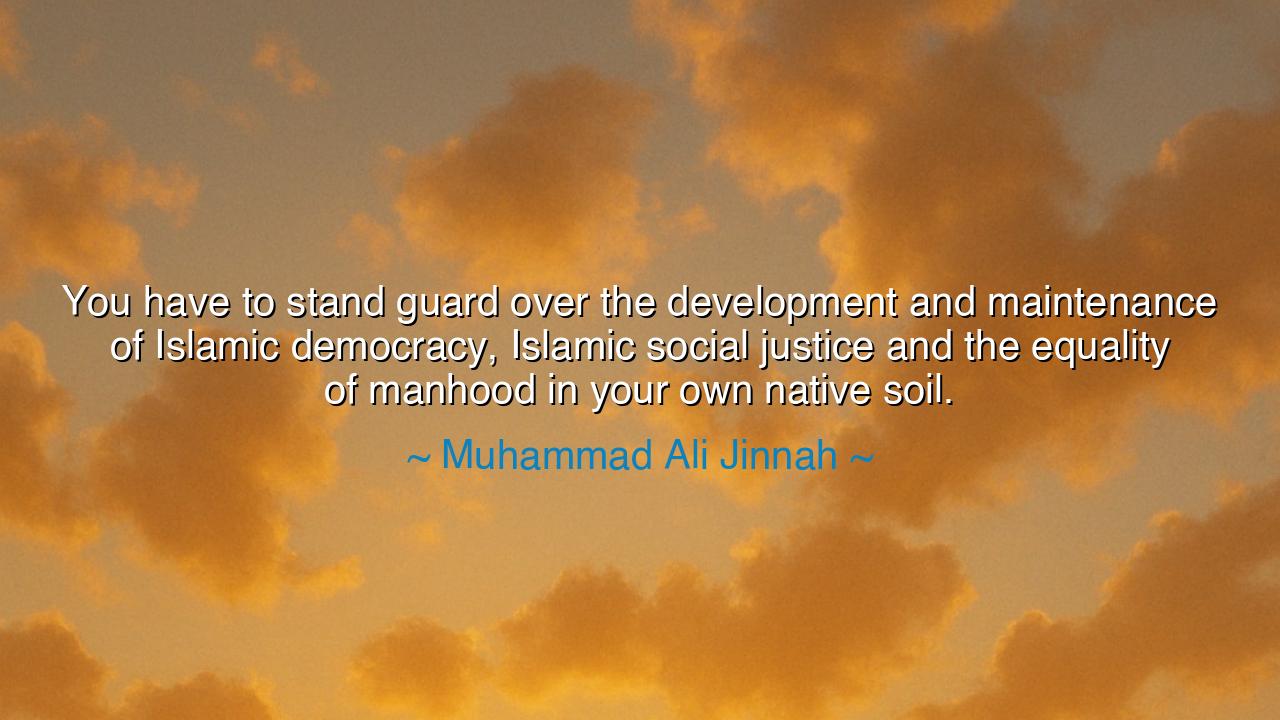
You have to stand guard over the development and maintenance of
You have to stand guard over the development and maintenance of Islamic democracy, Islamic social justice and the equality of manhood in your own native soil.






In the great journey of human history, there are moments when the foundations of a society must be consciously guarded, protected, and shaped, for those foundations are the very essence of a nation's future. Muhammad Ali Jinnah, the father of Pakistan, speaks with a wisdom that transcends the moment in which he lived: "You have to stand guard over the development and maintenance of Islamic democracy, Islamic social justice, and the equality of manhood in your own native soil." These words are a call to action, a summons to those who are entrusted with the future of their people. They carry a message of profound responsibility: that democracy, justice, and equality are not gifts that can be taken for granted, but ideals that must be nurtured, defended, and preserved with unwavering vigilance.
In the ancient world, the idea of justice and equality was often the domain of the gods and the rulers who were believed to be appointed by divine will. Yet, the greatest philosophers—from Socrates to Confucius—understood that justice was not simply a divine decree, but a moral order that could be attained only through human effort. Socrates challenged the unjust systems of his time, urging the people to think critically and to seek truth even when it contradicted established power. Confucius similarly stressed the importance of morality and justice in society, believing that rulers must work for the welfare of their people. In the same vein, Jinnah's words speak to the need for active participation and commitment in the creation of a society that embodies justice and equality for all, not as an abstract ideal but as a lived reality.
Jinnah's vision of Islamic democracy was not simply about following the dictates of religion; it was about ensuring that the values of Islam, which emphasize justice, compassion, and equality, were embodied in the governance of the state. This vision calls for the integration of faith and political structure, where democracy is not in conflict with Islamic principles but rather reinforces them. In this, Jinnah’s idea finds resonance with the ancient idea of divine kingship, where rulers were expected to govern according to the laws of justice handed down by the gods, but it differs in that it calls for equality and accountability in a way that challenges traditional power structures.
The great struggles of the 20th century, particularly the fight for independence and self-determination, echo the sentiments that Jinnah expressed. In India, the battle for independence from British rule was not just a political struggle, but a moral one—a battle for the right of the people to govern themselves according to their own values, their own laws, and their own vision for justice. Leaders like Mahatma Gandhi, who championed nonviolent resistance, and Jawaharlal Nehru, who envisioned a modern, secular state, recognized that true freedom lay not in the mere absence of foreign rule but in the ability to forge a nation based on the principles of equality and justice. Similarly, Jinnah's call for Islamic democracy was rooted in the belief that true self-governance could only be achieved when these ideals were preserved and protected by the citizens themselves.
Consider the birth of Pakistan, a moment of great triumph and tension in the struggle for an independent state for Muslims of the subcontinent. In those tumultuous times, Jinnah’s vision of Islamic democracy was not just a political slogan but a moral compass for the nation. He understood that the struggle for justice and equality was an ongoing one—that even in the establishment of a new country, the work was far from over. The work of building a just society could not be handed to a government alone but required the active participation of every citizen in the nation. The strength of the people in upholding the ideals of Islamic social justice and equality of manhood would be the measure of whether the nation could truly thrive.
Thus, the lesson of Jinnah’s words is clear: the development and maintenance of a just and equal society is not a passive endeavor. It requires the active vigilance of every person who believes in the values of justice and equality. Just as a gardener must tend to the soil every day, removing weeds and ensuring that the plants have what they need to thrive, so too must citizens protect and nurture their society’s moral and political foundation. Jinnah’s call for Islamic democracy is not simply about politics, but about living a life of moral integrity, ensuring that the values of justice and equality permeate all layers of society.
As we stand in the present, we must heed Jinnah's wisdom. Justice and equality are not inherited from the past; they must be earned and protected by each generation. In our own time, as we face struggles for civil rights, economic justice, and social equality, we are reminded that the battle is ongoing, and the work is far from complete. Jinnah’s legacy is a call to action—to stand guard over the principles that we believe in, to ensure that the dreams of a just and equal society are not left to rot in the soil but are actively nurtured by the hearts and minds of all people. Let us follow his lead, ensuring that the ideals of justice remain our guiding light, no matter the obstacles we face.






AAdministratorAdministrator
Welcome, honored guests. Please leave a comment, we will respond soon